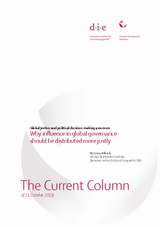The Current Column
Global justice and political decision-making processes
Why influence in global governance should be distributed more justly
Hilbrich, SörenThe Current Column (2019)
Bonn: German Development Institute / Deutsches Institut für Entwicklungspolitik (DIE), (The Current Column of 21 October 2019)
Bonn, 21 October 2019. The meetings of the Boards of Governors of the IMF and the World Bank in Washington, D.C. last week was like so many gatherings where decisions are taken by international organisations. The opportunities for member states to exert influence varied enormously. The US representative on the IMF’s Board of Governors, for instance, has more votes than all the representatives of the African, Latin American and Caribbean countries combined. States such as Japan and Germany have almost as many votes as all the African nations put together. And membership of other global governance institutions such as the G7, the G20 and the OECD is already restricted to a particular group of states. Even organisations such as the WTO, which officially affords a vote to every country, allow wealthy nations to deploy more personnel in negotiating processes and to use economic incentives to influence the position of other states, for instance. As such, influence over decisions taken within global governance institutions is distributed extremely unequal, and yet these institutions impact the living conditions of people all around the world. Representatives of developing countries and, more especially, emerging economies have repeatedly criticised these post-colonial conditions as unjust. After all, global justice is about more than sharing out the benefits and burdens of international economic cooperation. It is equally important to consider who makes political decisions and thus ultimately exercises political rule. We have certainly seen a number of shifts in global power in recent years. With the G20 in some cases assuming the role previously fulfilled by the G7, a number of countries have gained in influence. Furthermore, unhappy with their scope for influence, several emerging economies initiated the establishment of two new development banks (the Asian Infrastructure Investment Bank (AIIB) and the New Development Bank (NDB)) in 2014/15. There has also been a smaller reform of voting rights at the IMF. And a number of international organisations have attempted to achieve greater transparency and involve civil-society organisations to become more accountable. However, these reforms have only brought about limited change in the fundamental balance of power within global governance and they have been concerned primarily with involving a small number of rising powers to a greater extent, while poor countries in particular have remained out in the cold. The only situation in which decision-making processes involving such an unequal distribution of influence would likely be justifiable would be one in which international organisations as associations of states operated in a similar manner to private associations. Private individuals are free, for instance, to joint with others to form an association or a company without having to give others a say in the decision-making of these institutions. In the same way, it could be acceptable for states to simply form international organisations in accordance with their own ideas and interests. However, there is an institutional framework in place for private associations which governs interaction between individuals. This is designed to prevent parties to agreements being short-changed and harm being done to non-participants. Nevertheless, there are no institutions capable of establishing a similar framework for interaction between states. In addition, many global governance institutions fulfil public duties. For example, they are responsible for guaranteeing stability on the financial markets and driving efforts to improve environmental protection. These are matters that concern everyone. This does not necessarily mean that influence in global governance institutions must always be distributed equally among all countries. Population size and the extent to which a nation is affected by the decisions of an institution could justify differences. However, there does appear a need for extensive reforms given the current balance of power. For instance, major adjustments should be made to the distribution of votes at the IMF and the World Bank to benefit poorer states. Such a proposal may not be well received by governments who stand to lose votes as a result of such reforms. Maybe pragmatic reasons could be offered at times for using economic prosperity as a criterion for affording influence to certain states. Otherwise, there might be cause to fear that powerful nations might not support the respective institutions or may even torpedo them. At the same time, it is important not to lose sight of the fact that this violates key principles of justice. Every feasible step towards a more equitable distribution of influence should be taken from this perspective. When Europe’s modern nation states introduced free elections, they were initially conduced in most cases under census suffrage. The right of male citizens (women were usually excluded) to vote and the weight carried by their vote were based upon how many assets they had, how much land they owned or how much tax they paid. However, when it comes to formal decision-making procedures at least, those of us in democratic states are no longer prepared to accept such differences. Perhaps we will one day come to understand global governance institutions in the same way as public institutions in which everyone affected by their decisions has a vote.


